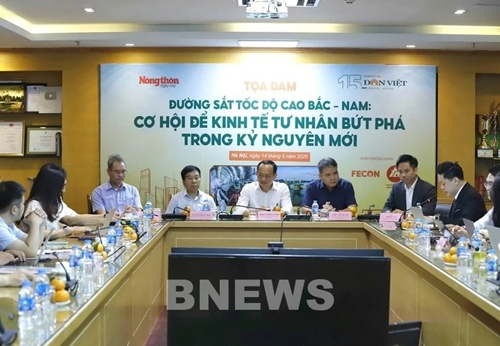At the event, which was held by the Dan viet newspaper, Deputy Director of the Ministry of Construction's Railway Project Management Board Chu Van Tuan stated that together with finalizing a feasibility study report, the Government is directing the completion of the policy frameworks to support domestic firms, creating favorable conditions for capable businesses to take part in the project.
    |
 |
|
At the forum held by the Dan viet newspaper |
Tuan said that businesses are racing to prepare for participation, equipping themselves with international technologies to get ready for undertaking technically sophisticated contract packages.
Deputy Editor-in-Chief of Dan viet newspaper Phan Huy Ha took steel giant Hoa Phat Group as a notable example, which has proactively announced investment in a steel rail production plant, a key component of the project, even without a formal purchasing contract from the Government. He stated that the move demonstrates the long-term vision and readiness of the private sector to accompany large national projects.
Meanwhile, Ho Duc An, Head of Technical Department at FECON, a leading Vietnamese construction and infrastructure corporation, acknowledged that domestic firms still face significant gaps in organizational capacity and modern construction technologies required for this mega project. He suggested them establish joint ventures with foreign partners and set localization ratios when receiving technology transfers.
In the same vein, Chairman of the Vietnam Construction Contractors Association Nguyen Quoc Hiep assessed that the financial capacity and organizational scale of many Vietnamese contractors remain modest.
Only about 20 companies can nearly meet the technical, technological, and financial requirements of the demanding rail project, he noted.
Against the backdrop, Hiep stressed that it is necessary to bring together contractors of all sizes to create a construction ecosystem capable of meeting the entire supply chain.
The Government has a very clear policy on prioritizing domestic resources for the project. Vietnamese private firms are not only encouraged but also enabled to engage in the value chain, from material supply and infrastructure construction to equipment manufacturing, operation, and maintenance.
Other experts said that the State should complete legal frameworks, support policies, and transparent mechanisms, creating a safe environment where private firms could invest, take risks, and thrive sustainably.
Source: VNA